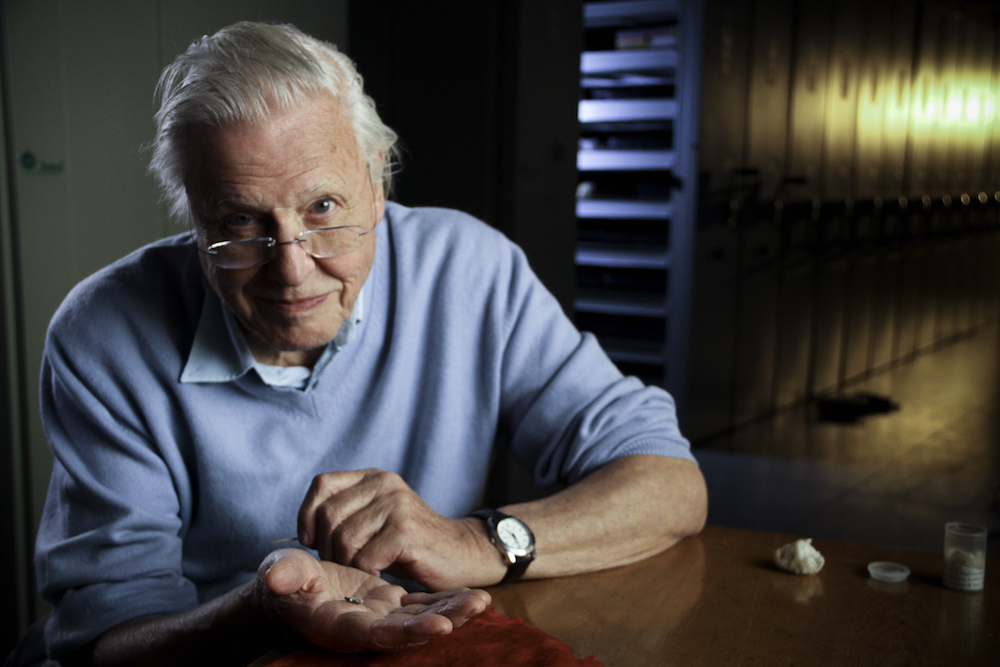Famed TV Explorer David Attenborough Shares His Favorite Adventure

WASHINGTON — Sir David Attenborough, the world-famous nature host, recently found himself in a bat cave in Borneo, dangling from a rope 300 feet (91 meters) above the ground, as a drone hovered around filming him.
At 89 years old, the narrator and host of such well-known programs as the BBC's "Life" and "Planet Earth" series shows no signs of slowing down. He made an appearance here last week at the Smithsonian Institution National Museum of Natural History to preview his latest show, "Rise of Animals: Triumph of the Vertebrates." The show premieres Wednesday (May 13) at 8 p.m. EDT and 9 p.m. PDT on Smithsonian Channel.
The bat cave incident happened just last year, when Attenborough was filming a scene for a 3D show about flying animals. The cave is home to three types of aerial creatures — bats, birds and cockroaches — and the idea was to film Attenborough as the birds came home to roost and the bats came out to hunt the cockroaches. [Flying Mammals: Gallery of Spooky Bats]
"We decided in the end that I would hang from a rope 300 feet above the ground," Attenborough told the audience. "It wasn't actually my idea."
The bats weren't due to come out until about 6 p.m., but the show's producers hoisted Attenborough into position at about 5 p.m. During the hour that he hung there waiting, Attenborough said, "I thought, gosh, that rope is thin!" When the bats finally arrived and an "octocopter" drone hovered nearby to film the event, he wondered what would happen if the drone hit a bat and the vehicle collided with him. Luckily, the bats steered clear of the drone, he said, "and well, here I am!"
Earlier in the day, Attenborough sat down with Live Science to talk about everything from his favorite experience during his travels, to how to stop humans from ruining the planet.
In real life, Attenborough is more soft-spoken than on TV, and looks young for his age (it was the day before his 89th birthday). After all this time, he still manages to conjure up a sense of wonder about the natural world.
Sign up for the Live Science daily newsletter now
Get the world’s most fascinating discoveries delivered straight to your inbox.
While he has had countless amazing experiences during his long and successful career in wildlife broadcast television, Attenborough highlighted one event in particular. "There is one definable moment," he said, "when suddenly, it is breathtaking:" the first time he scuba dived on a coral reef. He described "the sensation of being able to move without any physical effort at all [and seeing] the most extraordinary crustaceans, invertebrates of all kinds and nudibranchs [sea slugs] … the colors, the way they move — it's just mind-blowing."
As someone who grew up on a Hawaiian island, this reporter is very familiar with that experience. When Attenborough heard this, he skillfully pronounced the Hawaiian name of the state fish, "humuhumunukunukuāpuaʻa" (pronounced hoomoo-hoomoo-nookoo-nookoo-ah-poo-ah-ah).
Attenborough's new show traces the origins of animals, from the earliest vertebrates living in the Cambrian seas some 500 million years ago to the rise of mammals, marking the key developments that allowed animals to survive on land, breathe air and nurture their young. "It's the longest, most dramatic story in the universe," he said.
In the show, Attenborough travels to fossil beds in China to find missing links in the evolutionary history of vertebrates, from one of the earliest flying dinosaurs to the rodentlike ancestor of all mammals. [Gallery: Evolution's Most Extreme Mammals]
But if you ask Attenborough what his favorite animal is, he says he doesn't have one, "unless it's a human baby … that's the most extraordinary animal I can think of." (Though he later admitted his "spirit" animal would be a sloth.)
Despite his amiable manner, Attenborough said he is under no delusions about how humans have impacted the environment. "The evidence is incontrovertible," he said. "We dominate the planet… We take everything we want."
That doesn't mean humans are evil, but "we have to be realistic," he added.
One solution he proposed is to harness more solar energy. If America could put a man on the moon within 10 years of undertaking the project, then finding ways to harvest and store enough energy to support humanity's needs should definitely be possible, he said.
Meanwhile, Attenborough himself plans to keep exploring, and has no plans to retire. "I'm having a ball," he said.
Follow Tanya Lewis on Twitter. Follow us @livescience, Facebook & Google+. Original article on Live Science.











